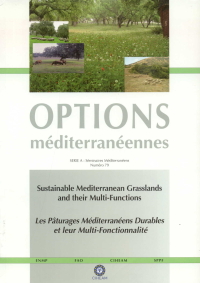| Article précédent | p. 97-101 | Article suivant |
Pastoral systems and agro-tourism in marginal areas of central Italy
Despite the important environmental value of mountains, the low productivity of the land and the distance from the main roads cause migration of rural populations to towns, on a global scale. The subsequent land abandonment results in further degradation of the natural resources. In Tuscany (Central Italy), pasture abandonment is present above all in mountain areas, and this is due to difficult environmental conditions (hot dry summers, cold winters, shallow soils, rough topography) and difficult social conditions (distance to the main roads, distance to services and social life). The conventional agronomic techniques can help to overcome the low productivity level caused by the climate and the soil, nonetheless they cannot increase income sufficiently so as to fix people in the rural areas. Several agronomic actions have been taken to limit these negative trends, however, rural people often do not perceive the effectiveness of these interventions and seek further rise of their incomes and improvements of their lifestyle. A new approach consists in developing links between pastoralism and agriculture and the modern economy, especially agrotourism. A survey has been conducted to investigate the number and distribution of agrotourism initiatives in Tuscany, and interviews have been made to study the needs of the communities. The results suggest maintaining agricultural techniques and, above all, further integration of the conventional agro-pastoralism and services offered in rural areas.
Malgré la grande importance environnementale des montagnes, la faible productivité de la terre et la distance des routes principales entraînent la migration des personnes rurales vers les villes sur une échelle globale. L'abandon conséquent de la terre cause davantage de dégradation des ressources naturelles. En Toscane (Italie centrale), l'abandon de pâturage est présent surtout dans les secteurs de montagne, ceci étant dû aux paramètres environnementaux difficiles (étés secs et chauds, hivers froids, sols peu profonds, topographie accidentée) et aux conditions sociales difficiles (distance des routes principales, distance des services et vie sociale). Les techniques agronomiques conventionnelles peuvent aider à surmonter la productivité faible due au climat et au sol, néanmoins elles ne peuvent pas augmenter suffisamment les revenus pour maintenir les personnes dans les secteurs ruraux. Plusieurs actions agronomiques ont été faites pour limiter les tendances négatives, toutefois les personnes rurales souvent ne perçoivent pas l'efficacité des interventions faites et cherchent une nouvelle élévation de leurs revenus et des améliorations de leur style de vie. Une nouvelle approche est constituée par le développement des liens du pastoralisme et de l'agriculture avec l'économie moderne, particulièrement avec l'agri-tourisme. Une recherche a été conduite pour étudier le nombre et la distribution d'agri-tourismes en Toscane, et des entretiens ont été menés pour étudier les besoins des communautés. Les résultats suggèrent de maintenir les techniques agricoles et, surtout, davantage d'intégration de l'agro-pastoralisme conventionnel et des services offerts dans les secteurs ruraux.
- [ Afficher ]
- [ Télécharger ]
- [ Exporter la citation ]
Vous pouvez télécharger la citation au format :
- [ Imprimer ]
-
Mots-clés
DEGRADATION DE L'ENVIRONNEMENT, DEVELOPPEMENT RURAL, MIGRATION URBAINE, PASTORALISME, POPULATION RURALE, TERRE ABANDONNEE, TOSCANE, TOURISME EN MILIEU RURALCiter cet article
Pardini A., Longhi F., Natali F. Pastoral systems and agro-tourism in marginal areas of central Italy. In : Porqueddu C. (ed.), Tavares de Sousa M.M. (ed.). Sustainable Mediterranean grasslands and their multi-functions . Zaragoza : CIHEAM / FAO / ENMP / SPPF, 2008. p. 97-101. (Options Méditerranéennes : Série A. Séminaires Méditerranéens; n. 79). 12. Meeting of the Sub-Network on Mediterranean Forage Resources of the FAO-CIHEAM Inter-regional Cooperative Research and Development Network on Pastures and Fodder Crop, 2008/04/09-12, Elvas (Portugal). http://om.ciheam.org/om/pdf/a79/00800625.pdf



